Notes from Town and Country
From Hazel, Highbury, 30 June 2020
My admission in an earlier diary that, whereas my husband loves our nearby park, to me it just feels like pretend countryside, produced one shocked email and several hurt comments from local friends. Our contributor Roger Hudson (compiler, too, of An Englishman’s Commonplace Book, which we’ll be publishing in September) told me that he had once felt the same way about Kensington Gardens, but had made a ‘conscious decision to abandon comparison with the real country of his childhood’. He was helped in this, he said, by the fact that parts of Kensington Gardens still felt rather like the parkland of a country seat, so providing a kind of transitional experience, not quite town and not quite country, and he advised me to strike out away from the joggers and dog-walkers into the wilder areas.
In the 1790s, when Stoke Newington was a village, Clissold Park was indeed a gentleman’s estate, surrounding Paradise House (today’s trendy café), which was built by the Quaker philanthropist and anti-slavery campaigner Jonathan Hoare. But Hoare hit hard times and for the next hundred years the estate was passed around until the building boom of the 1880s hit sleepy Stoke Newington, and the Ecclesiastical Commissioners bought it intending to make money out of development. At this point it was saved for the working people of the area by the dedication of an optical manufacturer called Joseph Beck and Jacob Runtz of the Metropolitan Water Board. Together they persuaded the Water Board to buy the land and create a public park, which was opened by the new Greater London Council in July 1889.
At the far end of the park are two lakes, Beckmere and Runtzmere, named in memory of these admirable men. This is my husband’s favourite spot, a somewhat more rural-seeming and usually less frequented part of the park, and on a balmy evening I accepted his invitation to take a walk there and, as it were, have another go. It certainly is a delightful, very unmunicipal area of woodland paths and old trees, with the additional magic that water brings to a landscape, and as I walked through the gates it was fairly easy to imagine myself entering the park of some great estate. Or would have been had it not been for the runners running, power walkers striding, bikers biking, children scooting and couples strolling, each on a mobile phone: (‘Have you tried a different mouse . . . ?’ ‘Yeah, 10 a.m. tomorrow, the whole department . . .’). The lakes were pretty busy too. Dabchicks were diving, ducks were flying low and landing in a flurry of foam, and on one of the islands a splendid swan was visible in the shade of a tree, curving its neck to preen itself. In the centre of the lakes complacent-looking ducks nested on small floating platforms. My husband remembered a park keeper telling him these had been put there for the benefit of terrapins, which were once popular pets but which were quickly offloaded when their owners discovered how big they were likely to grow. In fact I found myself enjoying the sheer energy of all this focused activity. But for getting myself into another frame of mind about the park, I decided I’d have to wait until lockdown was over.
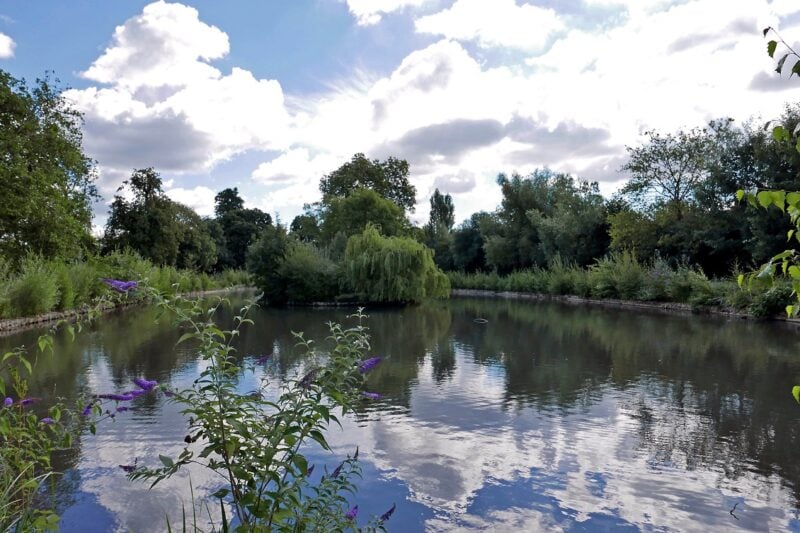
*
Like a lot of people, I imagine, these past months have made me truly appreciate our local shops, and this was the subject this week of BBC Radio 4’s Food Programme (available now on iPlayer). I was delighted to hear the voice of one of the owners of ‘Seasons and Blossoms’, our lovely local greengrocer-cum-delicatessen, which has kept us all going with good cheer and deliveries when the supermarkets, like great slow-moving beasts, were unable to get their act together. I hope people will go on supporting local shops when the crisis is over, because they deserve it, and they give colour and humanity to our neighbourhoods. I’m thinking particularly of the Aladdin’s Cave of a shop near Finsbury Park, whose elderly Chinese owner can produce almost literally anything you want from the dark and crowded shelves at the back – as evidenced today when she came up with a particular metal bracket we’d failed to find in any builders’ merchant’s. Garden compost, a shrimping net, a non-standard light fitting, ask and it shall be given unto you. Small really is beautiful.
*
Ambridge alert! I do apologize to readers who have no interest whatever in the subject, but feel I must add my voice to the national outcry over what has happened during lockdown to what was once Gail’s and my favourite soap, The Archers. Personally I suspect a plot on the part of the BBC to destroy it in Radio 4’s perennial and misguided search for a youthful audience. At first, understandably since it is recorded in advance, the inhabitants of Ambridge remained blissfully unaware of what was going on in the outside world. People went on drinking in the Bull and having soothingly pointless conversations with busybody Susan in the village shop. But when these episodes ran out I turned on the radio to find that the characters weren’t just social-distancing, they were no longer allowed to speak to one another at all. Since then we’ve suffered toe-curling, navel-gazing soliloquies from all of them in turn – OK for Hamlet, but not so good when it’s about selling second-hand farm machinery. What is all this? If we can meet up with guests on air while recording SF podcasts from home, surely BBC technology can do it for The Archers.
From Gail, Manaton, 30 June 2020
Hazy, lazy days of summer. The sheep are spending the hottest part of the day sheltering in the lee of the granite walls or in the long grass under the zelkovas. We planted them about twenty years ago and now they form a broad canopy of dappled shade which the sheep seem to love. The damsel flies have appeared on the lake as well, darting streaks of electric blue among the yellow flag irises and marsh marigolds, and in the long evenings swifts skim the water.
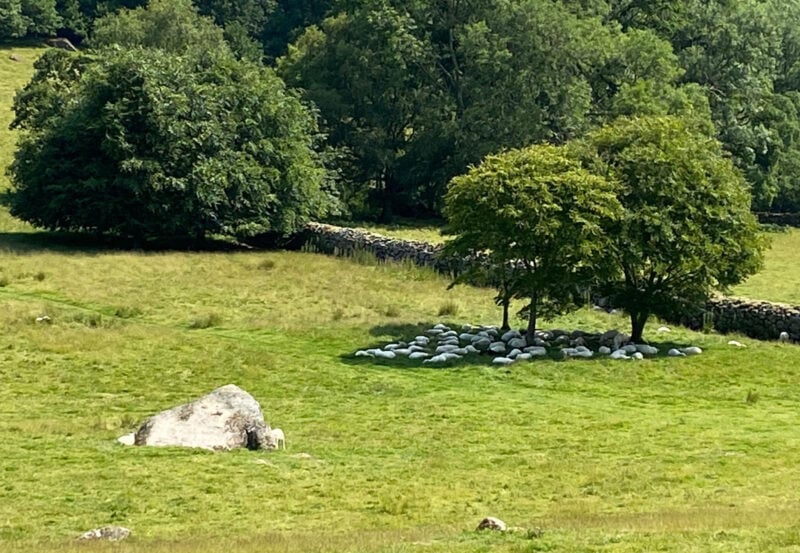
Up near the bridlepath rabbits have created a burrow under an outcrop of granite, and in the evening we sometimes see a small herd of roe deer leaping through the trees behind the house. In among the reeds in a rather boggy part of the field, slow worms have emerged to bask in the sun. They’re a beautiful shade of copper but, though we know they aren’t snakes, they still cause mild alarm when spotted.
Getting any work done in this weather is a bit of a struggle and yesterday I gave up altogether. A friend had suggested going to see a famous garden and taking a picnic, so off we went, six of us in convoy, up the M5 and then off on a minor road towards Wellington and down ever smaller Somerset lanes, their verges a cloud of cow parsley, until we reached a cattle grid and a long shaded drive beneath an avenue of lime trees. We’d arrived at Cothay, which dates back to the fourteenth century and is said to be the finest small medieval manor house in England.
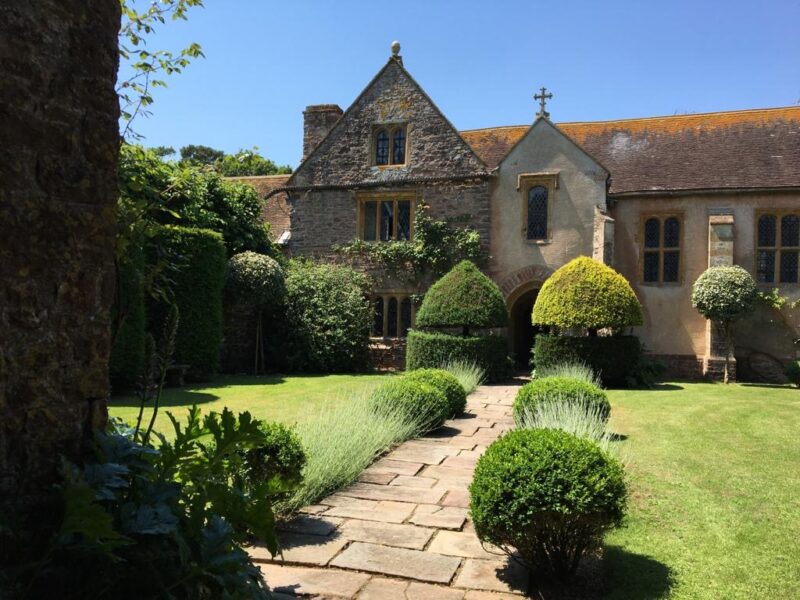
At the moment the house is closed, but the gardens have reopened. And what gardens they are ‒ a whole series of outdoor rooms surrounded by towering yew hedges, and each ‘room’ full of flowering shrubs, climbers and perennials. The garden scenes in the televised Wolf Hall were filmed here and I’m not surprised it was chosen as a location. Wandering down the 200-foot-long yew avenue that connects each room, I wouldn’t have been in the least surprised to see a Tudor figure disappearing around a corner in the distance.
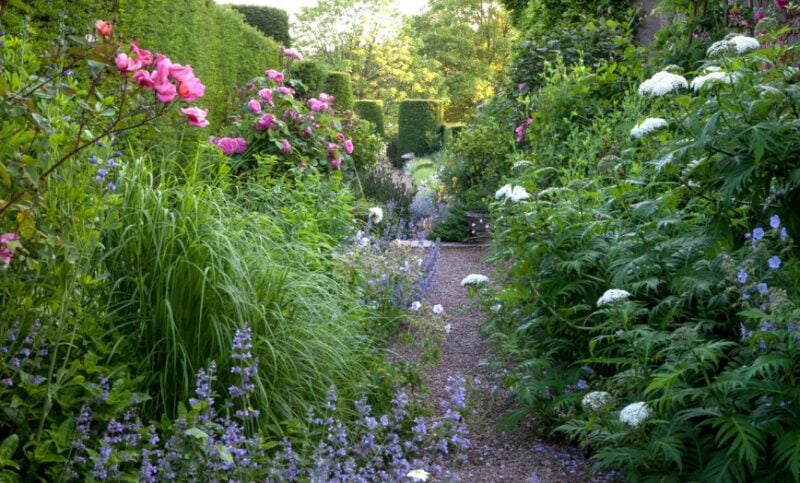
Which reminds me that the final volume in Hilary Mantel’s trilogy about Thomas Cromwell, The Mirror and the Light, is sitting on my shelf of unread books. I’m longing to open it but out in my garden there are a thousand and one things that need doing. Perhaps I’ll save it for the long winter evenings when the greenhouses are empty and beautiful gardens are closed to visitors. It’ll bring back memories of a magical day full of friendship and talk of plants in a timeless setting.
Now life is starting to return to normal, from the beginning of July we’ll be writing our diary monthly rather than weekly. We love your appreciative messages, but we’re aware that you receive other emails from SF, and that it’s possible to have too much of a good thing.





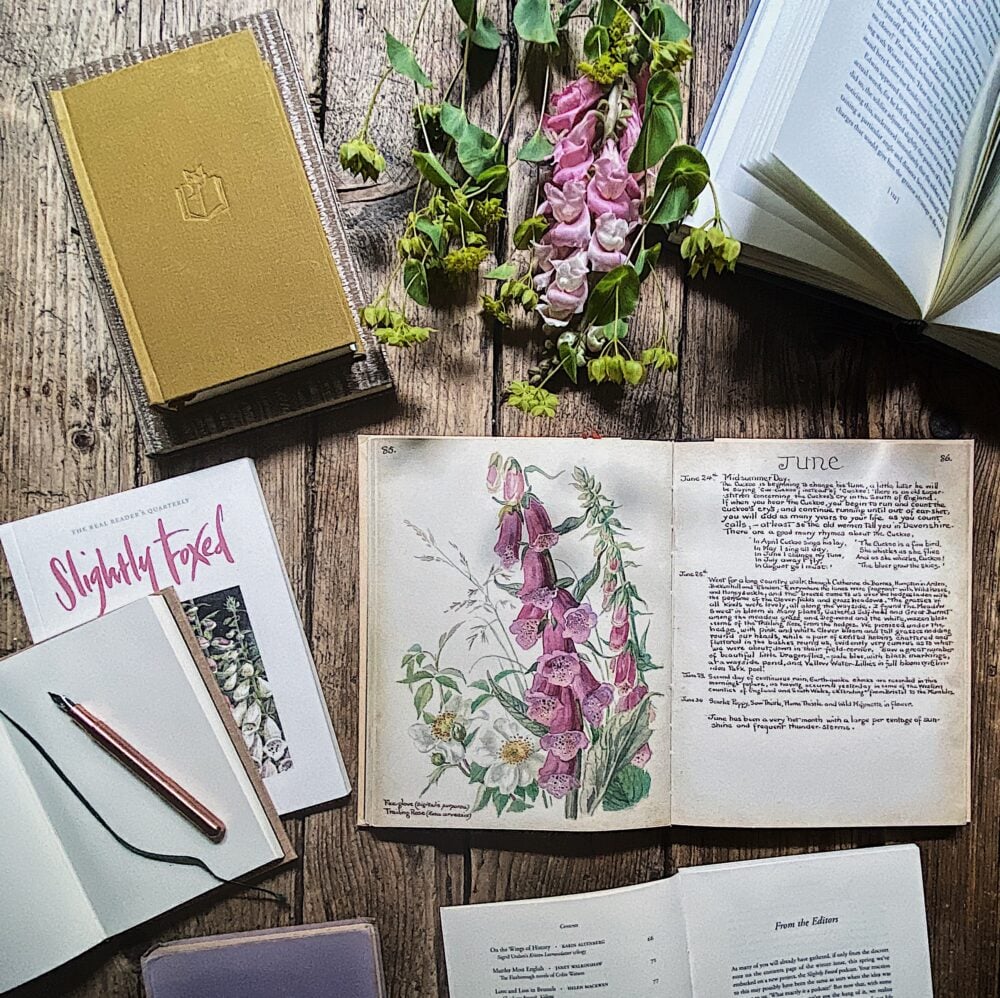
I’ve so enjoyed reading your Editors’ Diary, & marvel that you can find topics to write about each week. (I used to edit a gardening quarterly mag, so have some idea of writing ‘to order’ so to speak.)
The earlier item about The Archers, and ‘Brian’ being an SF subscriber made me laugh. I do so agree about the current monologues and wonder how many readers will be lost because of them. It doesn’t seem that impossible to have characters record while social distancing, other programmes are doing so. I grew up with The Archers and it has amused me for years, not to mention the useful causes they have publicised, like the Helen and Rob story. Now it doesn’t seem to matter if I miss an episode . . .
Carry on keeping on – Jill
I have loved reading the lockdown diaries. Luckily I live in a large house with even larger garden, in Suffolk, along with long suffering husband and elderly but young at heart retriever. Many lovely local footpaths in unspoilt farmland surround. But lockdown still had its claustrophobic and imprisoning effect. Reading the diaries has helped preserve what little sanity this retired GP has retained. I love Slightly Foxed and have just sent a younger family member a care package of three of your books. I’m a subscriber and big fan of all you do including the wonderful podcasts. Thank you and very well done for soldiering on through the dastardly pandemic.
Jane
Monthly? Great. Please keep it going as long as possible / you enjoy doing it.
Definitely one of the best wee outcomes of the mad 10 weeks.
The diaries have become a very welcome contribution to lockdown reading here in rural north Northumberland. It’s been fascinating to hear about life both in the very different countryside of the southwest and in the metropolis. Even now, the thought of visiting London again seems a very distant prospect. Entirely agree about the dismal episodes of The Archers, by the way.
I’ve absolutely loved these diaries. Quite understand that you don’t want to continue them weekly, so – many, many thanks for these gleams of light in the current darkness.
Dear diarists, thank you, as ever, for your beautifully written articles.
Gail, I’m delighted to read that you crossed the border into Somerset, (I’ve been wanting to head for Dartmoor). I thought you might like to know that Cothay is currently for sale . . . Just a cool £5,000,000.
Oh, how I agree about The Archers – what were they thinking of?! And what an opportunity missed – they dealt with foot and mouth so sensitively 20 years ago, and kept it topical, and in the past episodes have been ‘doctored’ to deal with unexpected events. Compare with the lockdown version of Springwatch, which has received so may accolades, and of Chelsea this year.
I just wanted to tell you both how much I have loved your diaries! They have been so completely soul soothing in these crazy times. I wholeheartedly agree on the toe curling aspect of the current state of The Archers and am beginning to wonder if they wouldn’t have been better off letting it lie silently until normal service can be resumed. Hey ho!
Hello Hazel – a quick note to say how much I enjoy your diaries. The ongoing relationship with Clissold Park is interesting . . . I think I’m more on your side than your husbands. Also The Empress of Ireland was a real treat.
Keep up the good work!
There can never be too much from Slightly Foxed. You have literally kept me going in these strange and unsettling times. You are all greatly appreciated. I plan to shake your hands one day soon.
M.H.
Thank you so much for your weekly diaries. They have been so enjoyable. We live in the heart of the country on the West coast of Argyll. Not as warm as Devon but similar in many ways from your descriptions. The London notes made a neat contrast. I wondered if you had made a rod for your backs but you have wisely reduced your output before you were stuck. Have you ever done a piece on The Diary of a Provincial Lady? With Georgette Heyer’s books it is where I go when the going is tough!
With very best wishes
Katharine Weir
I always smile when I see the Slightly Foxed Editors’ Diary in my inbox – a little window into England when I can’t be there and have no idea when I will be able to visit again. Your posts cheer me no end, marooned as I (and nearly everyone else in the world) am in my corner of the world, in my case northern New Mexico, equally delightful but not a bit like England. Thank you.
I have absolutely loved your weekly diary entries. Please don’t make them monthly! I was fascinated by the Clissold Park/Paradise House references and did some research to find out more; and I’m going to use Gail’s ancient track and stone wall with its creeping lichen as fodder for my Sevenoaks School pupils to do some creative writing.
Slightly Foxed is always a lifeline, but in lockdown it has been invaluable.
Dear Gail and Hazel,
Thank you so much for your weekly diary. It has been my English respite from my rather mundane existence here in Colorado during these trying times. It appears that it will be quite some time before I will able to visit England again, so I try to fill my longing with vicarious trips such as your walks and experiences have been. It is very beautiful in Colorful Colorado, but it is a very different beauty. I still have a couple Slightly Foxed editions unread, so there is always something to look forward to when one reads. Take care and my very best to all of my Slightly Foxed friends.
Ann Axelrod
Colorado Springs
Dear Editors
Your lovely weekly pieces have been an oasis of calm in a mad, mad world. They have helped keep me sane – thank you both. By the way, I gave up listening to The Archers once all those dreary monologue started. Recommend you do the same for now!
Dear Slightly Foxed Diarists,
Like many others, I really love receiving your wonderful weekly diary entries. I hope that sometime in the future you will gather them together into one of your little books; then we can all reread about those days past when we were all in lockdown!
I live with my husband in Austin, Texas, one of the terrible hotspots for the pandemic, so at age 73 we are pretty housebound. Luckily we have a backyard full of birds and mischievous squirrels to keep us entertained, as well as a small creek across the street where I can walk in the oak and juniper woods.
And books! How could we get through this period without BOOKS! I just read Rosemary Sutcliffe’s Blue Remembered Hills, what a lovely memoir. And I am so glad you reviewed The Outermost House in I think the spring issue, one of my very favorite books. And then, in this issue, the review of The Family from One End Street – what memories it brought back! I read that at age 9 when my family was living in Copenhagen for a year. Along with The Secret Garden, and Ballet Shoes and so many more wonderful English novels. But I had forgotten the Ruggleses. How could I ever have forgotten Lily Rose! Thank you so much for reminding me – and for all your wonderful books.
I am so glad England is able to begin opening up again, and hope that you all stay safe and sane until times become normal again.
Thanks so much, Sarah Manire
Thank you so much for your weekly diaries during the last trying months, nothing short of heroic keeping us connected and entertained. Always to be relished when they popped up in my inbox, and I enjoyed the contrast between the city and the country. Looking forward to everything you do in future. Agree, The Archers currently is dire. These boring monologues just point up how dull many of the characters are, and many of the actors aren’t up to it, either. So thank goodness for Slightly Foxed! Keep well 🐾
I have just stumbled on the Editors’ Diary, I live very near Manaton, where the WI meets in the afternoon and has proper teas. I think your Diary is just wonderful, in particular it is lovely to read about Dartmoor in this way. I am trying to work out which town has the ‘2 supermarkets’ is it Moretonhampstead or Chagford? I have been meaning to subscribe to Slightly Foxed for some time, I have now done it. I am so glad to see that you are reissuing Ronald Welch novels, they are a great read. By the way did you know that a bookshop is opening in Chagford? There is also a recently opened bookshop Dogberry and Finch in Okehampton in St James Street.
Yes, please, please publish the diaries; they are after all a sort of memoir and would have a very special place on our Slightly Foxed shelves. Such perfect counterparts in every way they are among the surprising and wonderful responses to Covid 19.
These are lovely pieces, and it’s a shame that we’ll only be receiving them on a monthly basis from now on. But I’ll enjoy relishing them when they do arrive!
The only thing that struck an unwelcome chord was the slight note of superiority when describing parks as ‘pretend countryside’. Often, parks are the only source of countryside that can be reached by people, especially those living in the city. So instead of disdaining them for what they lack, even because they’re too busy, can we not celebrate them for what they do offer? A snapshot of loveliness amidst an urban sprawl, for instance, even taking into account the crowds?